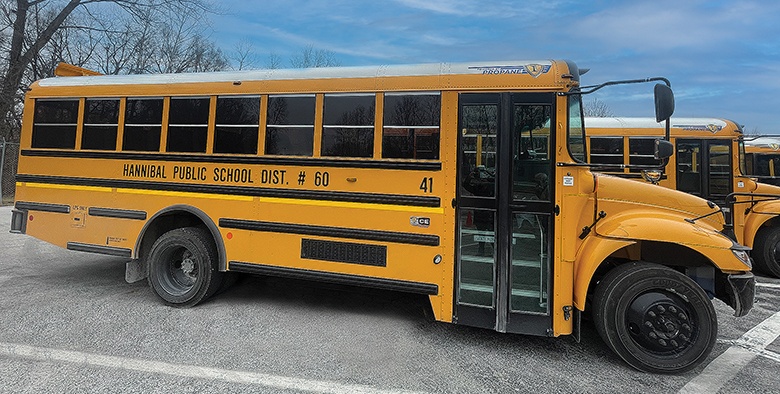
Missouri district adds nine propane school buses
Hannibal Public School District #60 has utilized funding from incentive programs like the Environmental Protection Agency’s Clean School Bus Program and the Missouri Propane Education & Research Council to double down on its commitment to substantially reduce its carbon footprint with propane school buses. Plans for a fully propane-fueled fleet are in the works.
“As we researched the various alternative fuels, propane stood out as the best option for our school district,” said Scott Speer, transportation director for the district.
Located in northeastern Missouri, Hannibal Public School District received two propane school buses earlier this year, with four more en route and an additional three on order. With the addition of the new propane buses, 22 percent of the district’s fleet will run on clean, low emission fuel.
The nine propane buses are replacing diesel buses that are about 20 years old and emit known carcinogens. Unlike diesel, propane autogas is a nontoxic, non-carcinogenic and non-corrosive fuel, and is classified as a non-contaminant by the U.S. Environmental Protection Agency.
Four of the propane school buses will be awarded $22,000 per bus through the first round of funding of the Clean School Bus Program, which has the stated goal of replacing old diesel buses with clean-operating school buses.
Additionally, the district will receive a $2,000 rebate per bus through the Missouri Propane Education & Research Council. The Council, created by state statute to provide propane safety and education programs, has pledged $1 million to help school districts transition from diesel buses to propane models.
Propane school buses are clean and affordable solutions that eliminate the particulate matter and harmful emissions found with diesel buses. Speer said that the staff and board of directors were thoughtful about selecting an affordable, practical clean fuel for its new buses; they looked at several options before landing on propane autogas.
“Electric buses are very popular right now…However, an electric bus costs more than three times the amount of a diesel-powered bus,” said Speer.
The district looked at the entire picture when making its decision, including the initial purchase of the buses, infrastructure, fuel and ongoing maintenance costs.
“When comparing infrastructure costs, compressed natural gas buses would have required an extensive renovation to our facilities, and that has a significant cost,” Speer said. “Conversely, propane is incredibly stable and does not require our facility to undergo extensive renovations. Furthermore, propane itself is a much more affordable fuel than diesel. Simply put, propane was a way that Hannibal transportation could save taxpayer dollars while providing a cleaner alternative fuel to diesel.”
Compared to diesel, buses fueled by propane autogas lower total cost of ownership for school districts by saving on fuel, fluids and filters. Supplies such as diesel particulate filters, manual regeneration and diesel exhaust fluid, and other complex after-treatment devices aren’t needed on a propane bus. Oil changes on propane buses are also simpler and less expensive.
Big River Oil, which successfully won the bid to supply propane to Hannibal Public Schools, has partnered with the district to assist in the purchasing and installation of the infrastructure necessary to fuel propane buses on school property. The district can fuel two buses at once with its stations, with the ability to scale upward when needed. Propane infrastructure costs less to install than any other transportation fuel.
“Propane school buses are better for our children, better for our community and better for the environment,” said Steve Ahrens, president of the Missouri Propane Education & Research Council. “They eliminate harmful tailpipe emissions while stretching taxpayer dollars. Hannibal Public School District 60 is truly making a wise investment. By choosing propane buses, the district was able to remove an additional seven diesel buses from school bus stops than if they had chosen to go with electric buses.”
The district, which operates a fleet of 37 buses, is currently paying $4.10 per gallon of diesel and $1.69 per gallon of propane. The alternative fuel federal excise tax credit will further accelerate fuel savings for the district by $0.37 per gallon.
“Any savings from propane buses will be used to help support a high-quality education for all of Hannibal’s students,” said Speer.
Hannibal Public School District was one of two schools in Missouri to receive funding for propane buses through the Clean School Bus Program in 2022. Today, there are more than 300 propane buses operating in Missouri and more than 20,000 across the nation.
The Missouri Propane Education & Research Council (MOPERC) is a not-for-profit organization authorized by the Missouri Legislature. Dedicated to propane education and public awareness, MOPERC provides industry training, consumer safety, appliance rebates and market development programs. The council is composed of 15 volunteer directors and administered by an executive staff. Visit PropaneMissouri.com.


